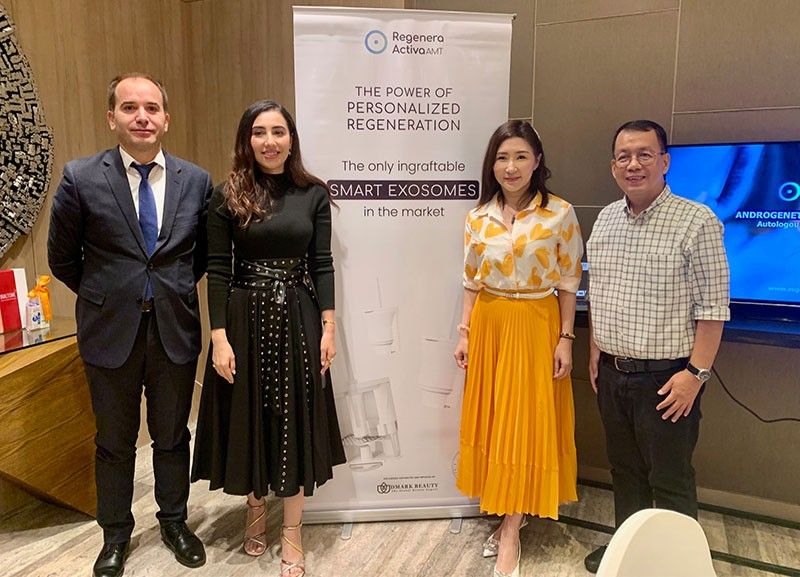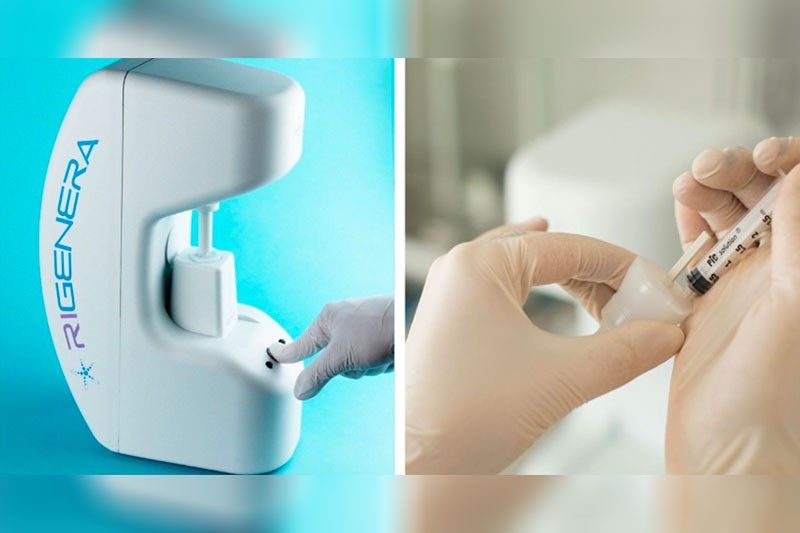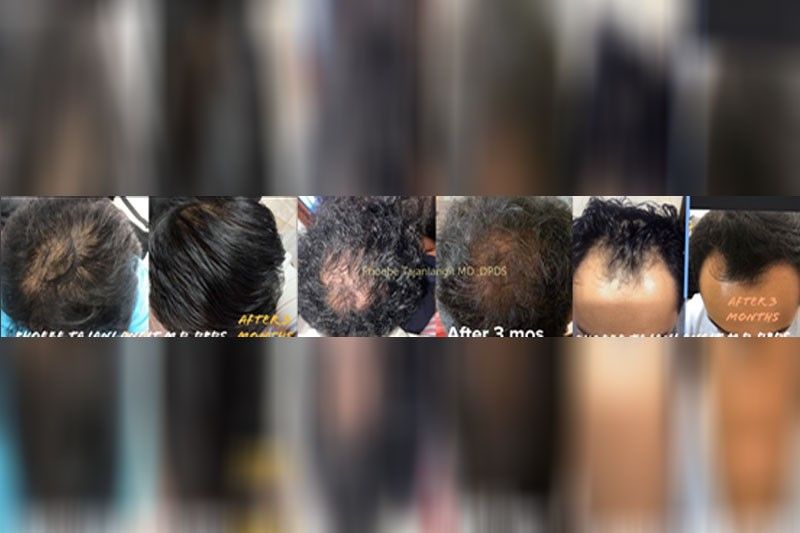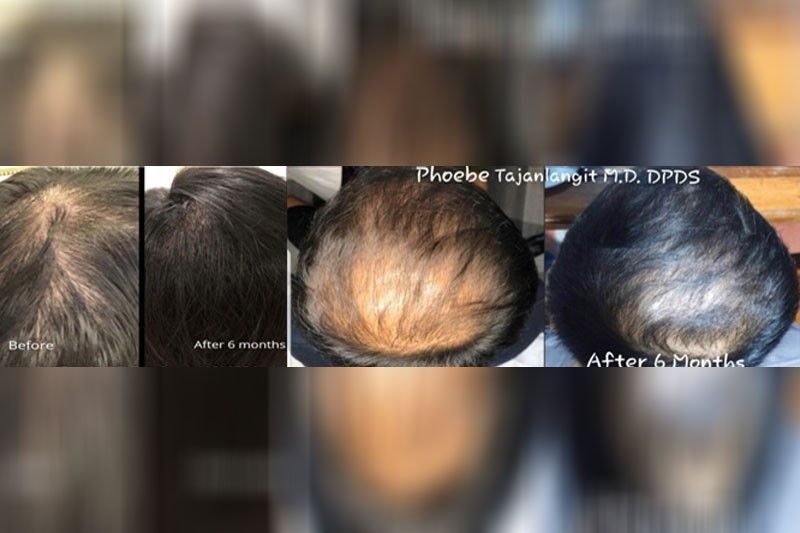Suffering from hair loss? Here’s the latest technology in hair growth


For many people, hair fall and hair loss are two common concerns, especially after the stresses of the pandemic.
But now there’s a new technology that stops hair fall and ensures hair growth in a fast, safe and effective way. Called Regenera Activa, it’s a device distributed locally by DMark Beauty, and DMark founder Nikki Tang brought in hair-growth expert Dr. Halah Taha from Dubai to talk to the media and train Filipino dermatologists on how to use it. Taha is an aesthetic doctor taking her master’s in Dermatology and Venereology, and offers Regenera Activa at her clinic in Dubai.
Basically, Regenera is an Italian technology started in 2013 that that is now in more than 60 countries and used in over 250,000 procedures. The technology employs micro-grafts extracted from the patient him/herself to regenerate and stimulate hair growth.
“Hair fall is caused by many reasons, including genetic or hormonal stress,” notes Dr. Taha. “We want to stop the hair fall and improve the hair, so we are using our own body growth factors, exosomes and stem cells to stimulate the healing process in the area.”
Taha says the trend now is people trying anti-aging and regenerative medicine using their own stem cells “without adding anything from the outside. It’s safe. It’s effective.”

Causes of hair fall
Hair fall has a wide range of causes. Dr. Taha says, “The most common one is genetic, due to the hormone dihydrotestosterone.” Other causes are stress factors, hormonal imbalances, PCOS (especially for females), thyroid problems, people with diabetes, certain hair products, straightening, lifestyle, even the coronavirus.
“We still don’t know why, but a lot of people who got infected, they are experiencing severe hair fall,” Taha says. “So it’s most important to understand what’s the reason of our hair fall in order to address the correct treatment.”
Treatments are also wide-ranging, from the topical (minoxidil) to a hair transplant, “which, usually as a female, we don’t prefer and we don’t do it.” Regenera falls in the middle of that spectrum.
Candidates for the treatment
The best candidates for Regenera treatment are people with some hair and live follicles, from which the micro-grafts can be extracted, not completely bald patients. People suffering from androgenetic alopecia can benefit, though not those suffering from alopecia areata, an autoimmune disorder that causes bald spots, or telogen effluvium, hair loss caused by severe stress or a sudden change in the body. Cancer patients who have undergone regular chemotherapy and are recovered and stable can also undergo the treatment.
“Usually we don’t do it for age 18 and below,” says Dr. Taha, “but I have two cases that are 16 years old with their parents’ approval.”

Regenera vs. a hair transplant
I asked Dr. Taha what the difference is between Regenera and a hair transplant, and she said, “With hair transplant, we are taking the hair from a certain area — let’s say from the occipital, where the hair is always very thick and very good — and we transplant it in the area where we have the deficiency or hair loss. With Regenera we are not taking the hair, we are taking the growth factors and the exosomes.”
Regenera is a 30-minute procedure compared to a transplant, which takes four to eight hours or more.
There’s also no downtime with Regenera, whereas a hair transplant requires weeks of recovery: “There will be the dots, bleeding, and swelling,” notes Dr. Taha. “The hair will shed and then it will grow back. With Regenera there is no downtime or side effects. The patient can travel, do work, meetings… everything on the same day. The only possible side effect is an infection, and that depends if the doctor is doing everything correctly and the patient is keeping the area clean for one to two days. And this is usually very rare.”

The process
Regenera should be done by a doctor in a clinic or hospital. Typically, “a client will come and we will do a consultation,” Taha says. “We will see if they are a candidate or not. Sometimes we will do Regenera as a monotherapy, with no need for any other treatment. Sometimes for an advanced case we can combine it (with other treatments).”
If the patient is a good candidate, the doctor will start the procedure by shaving one centimeter from the donor area. “Then after that we inject local anesthesia, so the patient will feel nothing — it’s completely painless.” Then they take around three small grafts of 2.5 millimeters each and put them in the machine. Tang notes that the actual device is as small as a coffeemaker and very transportable, so a number of doctors can share it with no issues. The heart of the system is a single-use cone that they put the tissue in, one for each patient, so it’s completely sterile.
“We use only normal saline, nothing extra added,” Taha says. “So there’s no chemicals, no manipulation, no modification of the cells.”
The machine then processes the cells in the saline solution for two to four minutes, cutting the 2.5-mm grafts into very small, microscopic cells. The resulting solution is then injected into the target area with no downtime needed. The procedure is also done only once a year.
Results
Within one to two months the client will notice that their hair fall will decrease immediately, and then on the third month they will start seeing improvement in the quality and thickness of their hair. “We tell our clients that, due to the hair cycle, maximum results will be seen within six months,” Dr. Taha says. “Usually after six months we have something called a TrichoScan that will measure the thickness of the hair, the number of hairs in each area, the diameter of the hair, the quality of the hair follicles.”
She adds that she’s been receiving comments from her clients’ hairdressers saying that they are cutting their clients’ hair more frequently. Not only that, they report that her patients’ gray hairs are coming in black!
It’s apparent that Regenera is a very promising treatment — not only in the field of hair growth — this kind of regenerative medicine has many other applications as well, ranging from treating stretch marks, to diabetic wounds, to even orthopedic problems like healing the worn cartilage in the knee. But that’s another story.
* * *
Regenera Activa is available at Asian Hospital & Medical Center; St. Luke’s Medical Center; Skin & Cancer Foundation; The Aivee Clinic; BeloMedical Group; Bench Skin Expert; Dr. Phoebe Tajanlangit; Dr. Julieta Arambulo (Asian Hair Restoration Center); Dr. Camille Caladiao; Dr. Aileen Wijangco; Dr. Cyd Madayag; Dr. Ryan Encabo; Dr. Deo Wong; Dr. Mary Liza Millora; Bodyworx Medical & Surgical Group; CMI; Avignon Clinic; Oroderm; Charm Medical Skin & Body Clinic; Nu Hart Hair Restoration Center; Skin Elite; Mary Mediatrix Medical Center; NQM Dermatology; Delaram Aesthetic & Laser Center; and Skinology Aesthetic Clinic.



















